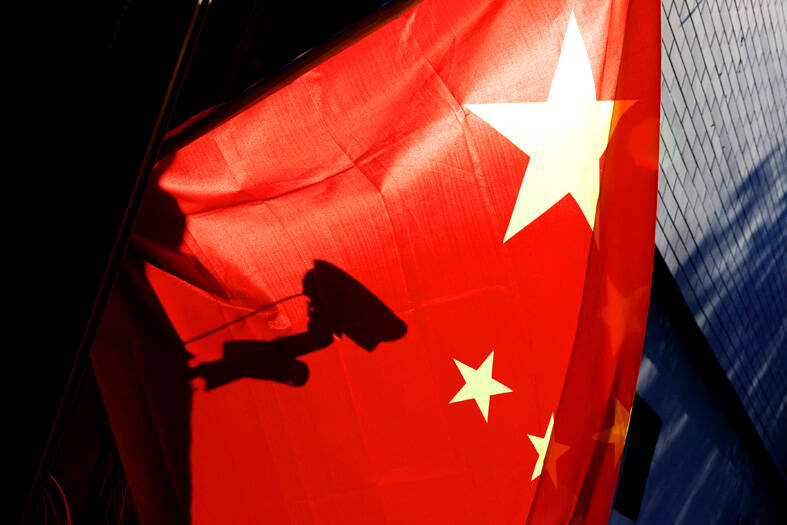A mere 9.3 percent of the Taiwanese public find China trustworthy, and 82.7 percent think that the Chinese threat has intensified over the years, a survey released on Monday by Academia Sinica showed.
In the poll conducted from Sept. 14 to 19, the Institute of European and American Studies asked 1,211 Taiwanese adults about US-Taiwan-China relations, the effectiveness of the US’ security commitment, their perception of the “status quo,” and Taiwan’s economic and national security.
Compared with 13.5 percent in 2021, the latest survey showed that only 9.3 percent of respondents believed China was a trustworthy country, while 26.4 percent disagreed and 57.6 percent said they strongly disagreed.

Photo: Reuters
At the same time, the number of respondents who believed the US was trustworthy also tumbled from 45.35 percent in 2021 to 33.9 percent, while 55.3 percent deemed the US not trustworthy.
Pan Hsin-hsin (潘欣欣), an assistant professor at Soochow University’s Department of Sociology, attributed the decline in trust to the US’ reaction to the Russia-Ukraine war.
Washington’s response to the Russian invasion gave Taiwanese an insight into how the US might react should a war break out between Taiwan and China, Pan said.
The survey also showed that 55.7 percent of respondents agreed that the US has been stepping up measures to guarantee Taiwan’s safety over the past few years.
Moreover, 64.4 percent supported regular patrols and flybys of US military ships and planes through the Taiwan Strait, while 65.4 percent believed the US president’s pledge to protect Taiwan.
Meanwhile, 59.6 percent of respondents believed that visits by top US officials to Taiwan enhances the possibility of US forces assisting Taiwan when needed.
The survey also showed that 44.6 percent of respondents supported the idea that Taiwan’s semiconductor industry serves as a “silicon shield” and that the chip shortage during the COVID-19 pandemic underscored the importance of Taiwan Semiconductor Manufacturing Co (TSMC, 台積電), which could prompt the US to send forces to assist Taiwan, Academia Sinica assistant researcher James Lee (李語堂) said.
However, 47.9 percent of respondents thought otherwise, the survey showed.
As for Taiwan’s status, the vast majority of respondents, at 91.4 percent, supported maintaining the “status quo.”
More than half of respondents thought of the country’s name as the “Republic of China” or the “Republic of China (Taiwan).”
With regard to identity, 62.5 percent considered themselves Taiwanese, 2.3 percent thought of themselves as Chinese and 32.2 percent identified as both.
The survey was conducted by the Election Study Center at National Chengchi University via telephone interviews.

Right-wing political scientist Laura Fernandez on Sunday won Costa Rica’s presidential election by a landslide, after promising to crack down on rising violence linked to the cocaine trade. Fernandez’s nearest rival, economist Alvaro Ramos, conceded defeat as results showed the ruling party far exceeding the threshold of 40 percent needed to avoid a runoff. With 94 percent of polling stations counted, the political heir of outgoing Costa Rican President Rodrigo Chaves had captured 48.3 percent of the vote compared with Ramos’ 33.4 percent, the Supreme Electoral Tribunal said. As soon as the first results were announced, members of Fernandez’s Sovereign People’s Party

MORE RESPONSIBILITY: Draftees would be expected to fight alongside professional soldiers, likely requiring the transformation of some training brigades into combat units The armed forces are to start incorporating new conscripts into combined arms brigades this year to enhance combat readiness, the Executive Yuan’s latest policy report said. The new policy would affect Taiwanese men entering the military for their compulsory service, which was extended to one year under reforms by then-president Tsai Ing-wen (蔡英文) in 2022. The conscripts would be trained to operate machine guns, uncrewed aerial vehicles, anti-tank guided missile launchers and Stinger air defense systems, the report said, adding that the basic training would be lengthened to eight weeks. After basic training, conscripts would be sorted into infantry battalions that would take

GROWING AMBITIONS: The scale and tempo of the operations show that the Strait has become the core theater for China to expand its security interests, the report said Chinese military aircraft incursions around Taiwan have surged nearly 15-fold over the past five years, according to a report released yesterday by the Democratic Progressive Party’s (DPP) Department of China Affairs. Sorties in the Taiwan Strait were previously irregular, totaling 380 in 2020, but have since evolved into routine operations, the report showed. “This demonstrates that the Taiwan Strait has become both the starting point and testing ground for Beijing’s expansionist ambitions,” it said. Driven by military expansionism, China is systematically pursuing actions aimed at altering the regional “status quo,” the department said, adding that Taiwan represents the most critical link in China’s

EMERGING FIELDS: The Chinese president said that the two countries would explore cooperation in green technology, the digital economy and artificial intelligence Chinese President Xi Jinping (習近平) yesterday called for an “equal and orderly multipolar world” in the face of “unilateral bullying,” in an apparent jab at the US. Xi was speaking during talks in Beijing with Uruguayan President Yamandu Orsi, the first South American leader to visit China since US special forces captured then-Venezuelan president Nicolas Maduro last month — an operation that Beijing condemned as a violation of sovereignty. Orsi follows a slew of leaders to have visited China seeking to boost ties with the world’s second-largest economy to hedge against US President Donald Trump’s increasingly unpredictable administration. “The international situation is fraught